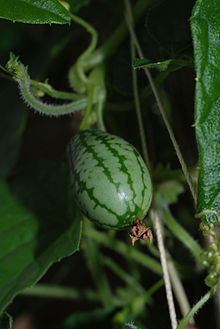Melothria scabra
| Melothria scabra | |
|---|---|

| |
| Vine with fruit | |
| Scientific classification | |
| Kingdom: | Plantae |
| Clade: | Tracheophytes |
| Clade: | Angiosperms |
| Clade: | Eudicots |
| Clade: | Rosids |
| Order: | Cucurbitales |
| Family: | Cucurbitaceae |
| Genus: | Melothria |
| Species: | M. scabra
|
| Binomial name | |
| Melothria scabra | |
Melothria scabra is a vine grown for its edible fruit. Fruit are about the size of grapes and taste like cucumbers with a tinge of sourness. Vernacular names include mouse melon, Mexican sour gherkin, cucamelon, Mexican miniature watermelon, Mexican sour cucumber and pepquinos.[1][2][3]
This plant is native to Mexico and Central America,[3] where it is called sandiita (little watermelon). It is believed to have been a domesticated crop before Western colonization of the Americas began.
Development
These plants are slow-growing when they are establishing themselves, but can eventually grow up to ten feet under proper conditions. They are drought resistant and pest-resistant relative to other cucumbers.[4] Similar to the cucumber, these plants are monoecious, producing both male and female flowers on the same plant. These plants can pollinate themselves, but the individual flowers are not self-fertile. Flowers are small and yellow, about four millimeters in diameter. Fruits develop at the base of the female flower.
References
- ^ "Pepquinos - World's Smallest Watermelons". Odditycentral.com. 13 July 2011. Retrieved 25 June 2016.
- ^ "'Micro melons' 20 times smaller than regular size". The Daily Telegraph. 13 May 2009. Retrieved 25 June 2016.
- ^ a b William Woys Weaver (2005). "Mouse Melons". Mother Earth News. Retrieved 2013-07-24.
- ^ Spurrier, Jeff (2013-05-14). "Mouse melon, a.k.a. Mexican gherkin: Tiny fruit is big on cute". LA Times.
External links
- How to grow and eat cucamelons outdoors in the UK from Homegrown Revolution
- Article from Mother Earth News
- Article from Bihrmann's Caudiciforms
